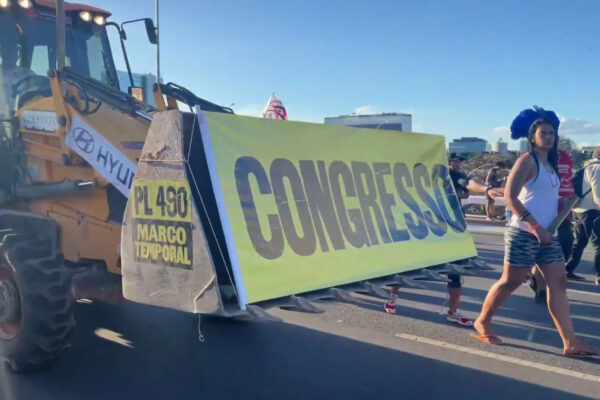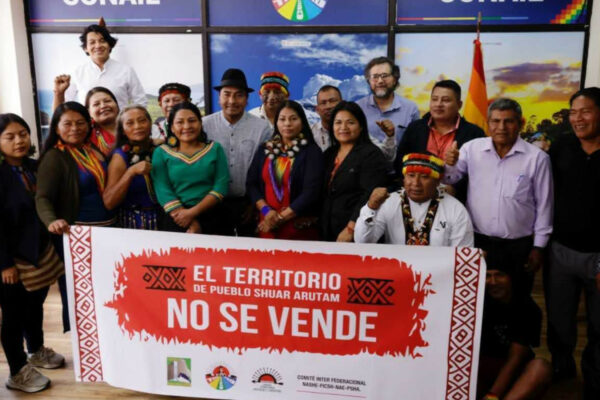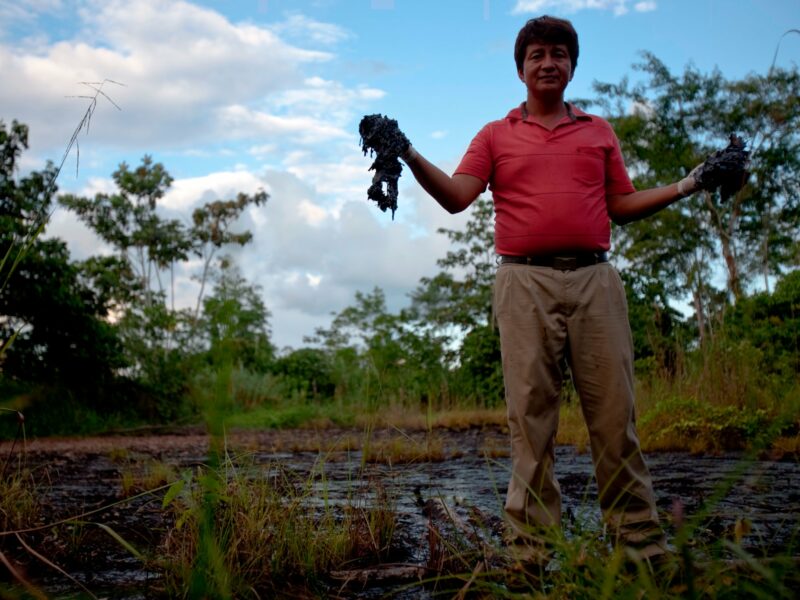The right to a jury of your peers is a central feature of the American system of justice. Steven Donziger, the environmentalist lawyer who is being persecuted by Chevron and two New York federal judges, is going on trial, again. He could be sentenced to six months in prison, and, again, a jury will not decide his fate.
Because of COVID-19, there has not been an in-person criminal trial in the Southern District of New York federal courts since March. Donziger’s latest trial, for “contempt,” was set to begin on September 9. Back in July, Donziger’s attorneys asked for a postponement, arguing that the health risk would prevent them from representing him in person. Judge Loretta Preska waited until 5 pm on September 4 before ruling that the trial could be delayed, but only until November 3. She had already turned down Donziger’s request for a jury. Donziger said that Preska’s delay until the last minute had caused him, his family, and his lawyers “a great deal of stress.”
Donziger has already served 13 months under house arrest awaiting this trial in his New York City apartment. Last month, he was disbarred in New York State. Some six years ago, he was convicted of “racketeering” in federal district court.
In none of these cases did Donziger ever get the chance to argue for justice before a jury of his peers.
In 2013 Donziger helped win a landmark legal case in Ecuador against Chevron for contaminating a vast stretch of rain forest in the Amazon headwaters larger than the state of Rhode Island. The Ecuadorean courts awarded the 30,000 plaintiffs, who are poor rural farmers and indigenous people, $9.5 billion to clean up the damage.
Instead of obeying the judgment and starting the cleanup, the oil giant counterattacked. Chevron had participated in every stage of the judicial process in Ecuador, after fighting to have the case sent there in the first place. But after it lost, its high-priced lawyers brought a new case against Donziger and his Ecuadoran allies in New York under the Racketeer Influenced and Corrupt Organizations Act, known as RICO, which was originally designed to pursue the Mafia.
Here’s where Chevron’s billions denied justice to Donziger and the Ecuadoreans. At the last minute, Chevron dropped its demand for monetary damages, which meant that Donziger was no longer entitled to a jury trial. In other words, the corporation was willing to keep spending vast sums of money on the case with no hope of financial compensation. (Donziger estimates that the oil giant has spent $2 billion pursuing him; Chevron has declined to give a figure.) Respected Harvard law professor Charles Nesson wrote last year, “Chevron amended its demand to cheat Donziger out of a jury.”
All the corporation wanted now was a judgment that Donziger and the others were guilty, which it could use to thwart their legal efforts to collect for damages in the United States and other nations. (Chevron had sold its assets in Ecuador years earlier, but the plaintiffs in that country are seeking damages in other jurisdictions.)
Of course, no one from the Ecuadorean rain forest would have served on that jury. But it would have included ordinary New Yorkers who could have brought their life experiences to bear on judging and weighing the testimony. Instead, Lewis A. Kaplan, a career corporate lawyer turned federal judge, decided the case alone – and he chose to believe Chevron’s star witness, a defrocked former Ecuadorean judge named Alberto Guerra who testified that Donziger and an Ecuadorean lawyer had bribed him to ghostwrite the decision. It later emerged that Chevron had paid Guerra to move to the United States – where he is now living incognito – and rehearsed his testimony with him 53 times.
The string of injustices continued after Kaplan’s original unjust racketeering verdict. Chevron demanded access to Donziger’s phone and computer; Donziger declined, contending that handing over his electronics would violate attorney-client privilege. Kaplan asked federal prosecutors in the Southern District of New York to charge Donziger with contempt. After the prosecutors declined, Kaplan took the nearly unprecedented step of appointing a private attorney, one Rita Glavin, to prosecute Donziger. Legendary human rights lawyer Martin Garbus, who is part of the Donziger defense team, said, “This is the first case I have seen where a judge let a private corporation take over the prosecutorial power of the US government to silence a critic.” (Months later, it turned out that Glavin’s corporate law firm, Seward & Kissel, had financial tiesto Chevron.)
Judge Loretta Preska, who is hearing the contempt case, put Donziger under house arrest, 13 months ago, and denied his requests to be released on bail. Preska insinuated preposterously that Donziger, who is married with a 14-year-old son, could flee the country. (Meanwhile, the former Minneapolis police officer accused of murdering George Floyd is out on bail.)
The onslaught against Donziger continued. Last month, a New York state court stripped him of his law license. The Appellate Division, First Department reversed the recommendations of John Horan, a referee appointed by the New York Bar Association, who had found after presiding over several open hearings that Donziger should be allowed to keep practicing law. Horan upbraided Chevronfor its “extravagant…unnecessary and punitive” pursuit of the human rights lawyer. (Sean Comey, a senior Chevron spokesperson, did not answer e-mailed questions, including a request for a response to Horan’s charge.)
On the positive side, an alarmed movement is growing worldwide. Some 29 Nobel laureates, including nine Peace Prize winners, signed a letter defending Donziger; 475 lawyers and human rights defenders signed another letter, which called the struggle “one of the most important corporate accountability and human rights cases of our time.” What’s more, a panel of seven distinguished American lawyers formed a Monitoring Committee whose stated goal is to “ensure” that Donziger’s upcoming trials “are conducted in a way that upholds due process, judicial ethics and the rule of law.” The Monitoring Committee includes Michael Tigar, the prominent attorney and law professor, and Nadine Strossen, the former president of the American Civil Liberties Union. The committee noted wryly, “Trial monitoring committees are often seen in high profile cases around the world, but they’re most often employed in developing countries with problematic judiciaries. Trial monitoring committees are exceedingly rare in the United States, only formed in the most problematic circumstances.”
But much of the mainstream US press continues to ignore the story.
Meanwhile, there’s no justice for the more than 30,000 people living in eastern Ecuador who are surrounded by oil-soaked land, streams, and rivers. Five peer-reviewed scientific studieshave shown an increased risk of cancer and other health risks in the area. (Chevron funded its own peer-reviewed study, which claimed to find no such cancer risk.)
Donziger estimates that approximately 10 people he knew personally have died from cancer in the polluted rain forest zone. Rosa Moreno, who passed on in 2015, was his age, and one of his closest friends in Ecuador. He remembered: “Rosa was a professional nurse, a strong leader, and she had a warm heart with a great smile. She ran the clinic in the town of San Carlos with no doctor. We grew up together on the case. Rosa kept a spiral notebook in her inimitable script where she wrote out in pencil the name of every person in her community who had died of cancer.”
Two months ago, Oscar Herrera, 65 years old, also died of cancer. He was a major leader of the Amazon Defense Coalition, the democratic grassroots organization that started campaigning for environmental justice back in the early 1990s. His home, in Campo Auca, was near several polluted oil well sites. Donziger told me he holds Michael Wirth, the CEO of Chevron, responsible for the continuing deaths, because the corporation refuses to obey the judgment in Ecuadorean courts and start cleaning up the poisoned zone.
Donziger said, “Chevron’s active evasion of court judgments under Wirth’s leadership makes him the person ultimately responsible for what are certainly hundreds if not thousands of deaths in Ecuador, caused by exposure to the company’s toxic contaminants in the water, soils, and air that could have been properly remediated had the judgment been respected. In any civilized society that respects the rule of law, Mr. Wirth and the other Chevron officials behind this environmental and humanitarian catastrophe would be held legally responsible.”













